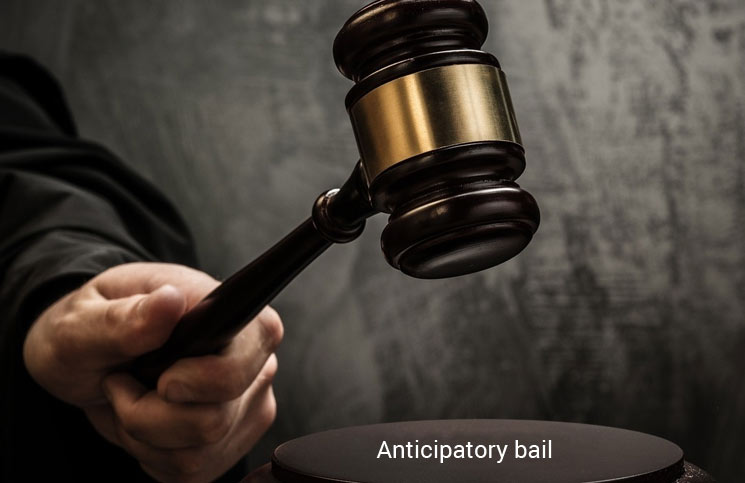Anticipatory bail in 498a /406 offences.
The Supreme court quoted that the sections under 498a and 406 under the Indian penal code are widely misused and for no reason the husband and family members are prosecuted and jailed thereby tarnishing the reputation of the family the sections are exactly termed as “legal terrorism”.

The supreme court in recent judgement of Arnesh Kumar Vs. State of Bihar has made mandatory compliance of guidelines
All the State Governments to instruct its police officers not to automatically arrest when a case under Section 498-A of the IPC is registered but to satisfy themselves about the necessity for arrest under the parameters laid down above flowing from Section 41, Cr.PC;
All police officers be provided with a check list containing specified sub- clauses under Section 41(1)(b)(ii);
The police officer shall forward the check list duly filed and furnish the reasons and materials which necessitated the arrest, while forwarding/producing the accused before the Magistrate for further detention;
The Magistrate while authorising detention of the accused shall peruse the report furnished by the police officer in terms aforesaid and only after recording its satisfaction, the Magistrate will authorise detention;
The decision not to arrest an accused, be forwarded to the Magistrate within two weeks from the date of the institution of the case with a copy to the Magistrate which may be extended by the Superintendent of police of the district for the reasons to be recorded in writing;
Notice of appearance in terms of Section 41A of Cr.PC be served on the accused within two weeks from the date of institution of the case, which may be extended by the Superintendent of Police of the District for the reasons to be recorded in writing;
Failure to comply with the directions aforesaid shall apart from rendering the police officers concerned liable for departmental action, they shall also be liable to be punished for contempt of court to be instituted before High Court having territorial jurisdiction.
Authorising detention without recording reasons as aforesaid by the judicial Magistrate concerned shall be liable for departmental action by the appropriate High Court.
We hasten to add that the directions aforesaid shall not only apply to the cases under Section 498-A of the I.P.C. or Section 4 of the Dowry Prohibition Act, the case in hand, but also such cases where offence is punishable with imprisonment for a term which may be less than seven years or which may extend to seven years; whether with or without fine.
But once FIR under 498a/406 is registered the apprehension of arrests looms even with the guidelines and safeguards as to be mandatory implemented by police. The police can follow the guidelines and can arrest the person . still the offences are non-bailable and possibility of an arrest looms on the person.
But generally the trend in court is that the anticipatory bail is granted in the cases of matrimonial offences under the penal code but very strict conditions are imposed these are-:
- Return of dowry articles
As held in Vijender sharma v. state Anticpatory Bail was granted subject to the conditions that the petitioner will return all the gold/silver jewelry articles still in his possession to the complainant before the concerned SHO. petitioner will deposit a sum of Rs.1 lakh additionally with the Registrar General of this Court in the name of the complainant, which amount shall be disbursed subject to the outcome of the trial of this case. The petitioner will join investigation as and when required and would not intimidate the witnesses.
2. By giving maintenance amount and returning jewelry
As held in Dr. Sunil Kumar V. State
With consent of parties, afore-noted applications are disposed of with the following directions:
(a) Rajesh would replace all the cheques which he has issued in the name of Shalini Arya pursuant to orders passed by learned Metropolitan Magistrate in the proceedings under Protection of Women against Domestic Violence Act, 2005 by issuing cheques in the name of ‘Shalini’. This would be done within a week from today.
(b) Photocopies of the medical treatment of Baby Bhavishika would be handed over to Rajesh. Rajesh would be entitled to consult a reputed cardiologist and future medical treatment of Baby Bhavishika would be borne by Rajesh.
(c) Future medical of Shalini pertaining to treatment for tuberculosis by her would be reimbursed by Rajesh on the bills being furnished by Shalini to Rajesh.
(d) Rajesh would continue to pay to Shalini Rs. 10,000/- per month or such other amount as may be directed to be paid by the learned Metropolitan Magistrate in the proceedings under Protection of Women against Domestic Violence Act, 2005 by means of a cheque payable in the name of ‘Shalini’.
(e) Rajesh would facilitate visit by the I.O. in company of Shalini to his house for opening the almirah in which cloths and jewellery of Shalini are stated to be kept. Shalini would be permitted to take possession of the same after an inventory is prepared.
(f) All the petitioners would cooperate with the I.O. in the conduct of investigation.
On compliance of afore-noted consent directions, in the event of arrest, petitioners would be released on bail by the I.O. on their furnishing a personal bond in the sum of Rs. 10,000/- each with one surety each in the like amount to the satisfaction of I.O.
18. It is made clear to Rajesh Arya that any violation of the terms of the consent directions would render liable to be withdrawn the benefit of the present order.
3. Bail without any condition of return of dowry items
In Vishal Arora V. state
In my opinion, the petitioner cannot be denied bail on the ground that dowry and jewellery of the complainant has not been returned so far. The learned counsel appearing on behalf of the petitioner has taken a stand that the entire dowry and jewellery has already been returned to her. There seems to be a dispute between the parties on this aspect. If her dowry and jewellery is not returned, then she may take proper proceedings before the competent Court for return of dowry and jewellery as per law.
In the facts and circumstances of the case stated above, it is ordered that the petitioner may be released on bail in the event of his arrest on his furnishing bail bonds in the sum of Rs.20,000/- with one surety in the like amount to the satisfaction of the arresting officer. Thepetitioner is directed that he shall participate in the investigation as and when called by the Investigating Officer. In the event the petitioner fails to participate in the investigation, then the State will be at liberty to apply for cancellation of his bail.
4. Bail as contents of FIR are vague
In the present case of Pavitra Uraon And Ors. vs State Of Chhattisgarh, if we consider the contents of the FIR, lodged by the complainant on 24-1-2007, it shows that she was being treated with cruelty by the applicant on account of demand of dowry. However, the specifications regarding dowry are vague and general pertaining to the items etc.
5. Complainant residing in matrimonial home
Proceedings under Section 498A/406/34 IPC are not to be converted into recovery proceedings. However, it is the desire of a Court to try and ensure that matrimonial disputes are resolved. Attempts were made in the present case in this direction, but unfortunately have failed.
Considering the fact that the complainant is still residing in the matrimonial house, but in a separate portion thereof and the fact that she and her children are otherwise being provided with maintenance by the petitioner No. 1, I am inclined to admit the petitioners to anticipatory bail as prayed for. It has to be additionally noted that the petitioners have cooperated with the investigating officer during enquiry. Since 6.2.2004 petitioners are under interim protection.
Petition stands disposed of with the direction that in the event of arrest, on petitioners furnishing a personal bond in the sum of Rs. 5,000 with one surety in the like amount to the satisfaction of the Arresting Officer, petitioner would be released on bail
Conclusion
Generally the bail in matrimonial proceedings are easy but may come with stringent conditions. the Anticipatory bail in cases of 498a/406 are granted easily these days and conditions depends on facts of each case.
Adv. Nitish Banka
nitish@lexspeak.in













